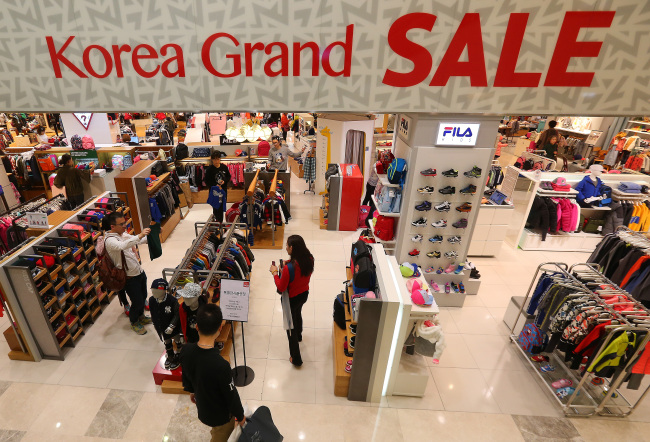Korean Black Friday falls short of market expectations
By Korea HeraldPublished : Oct. 2, 2015 - 18:49
Bargain hunters waiting in long queues for a shopping spree and numerous doorbuster deals on thousands of products may be what the government expected for what it called “Korea Black Friday.”

But consumers and retailers participating in the two-week sale event criticized the government for its hasty decision to host the nationwide shopping festival and the misleading name.
The country borrowed the term Black Friday, from the U.S.’ big shopping day after Thanksgiving, for its largest-ever sale event, involving about 26,000 stores encompassing department stores and online shopping malls to offer up to 70 percent discounts to shoppers from Oct. 1 to 14.
It is designed to boost sales and vitalize consumer sentiment hurt by the Middle East respiratory syndrome outbreak between late May and early July. Retailers had less than a month to prepare for the event.
“I do understand the government’s intention. But calling it Black Friday raised consumers’ expectations and I can see some showing disappointment after finding out that it’s not like the sale event in the U.S.,” a Lotte Department Store official said.
Although the Ministry of Trade, Industry and Energy said it will change the event’s name from next year, the differences between the two are myriad.
In the U.S., retailers and manufacturers hold the massive shopping event to clear out inventories, while the Korean version is orchestrated by the government.
The U.S. department stores directly buy commodities from product-makers which means they can sell off inventories at a bigger discount rate. But in Korea, brands decide whether they want to participate in a sale event and the bargain rate as department stores only lease space to them to get commissions.
“We have no right to slash prices. So we instead focused on giving out gift vouchers and other promotions,” the official said.
Despite the disruptive factors, some 120,000 people visited a Lotte Department Store in the popular shopping district Myeong-dong on the first day and its sales marked a 28 percent increase from the same day a year ago.
But the purchases were mainly made on the outlet floor where the retailer put out unsold stock from earlier months.
Some home appliances and electronic gadgets were excluded from the sales.
“LG and Samsung refused to join. If they say so, there’s nothing a department store can do. We can’t force them,” he said.
The discount rate in most stores stayed around 20-30 percent on average, which is the same rate they usually offer during regular sale events around this time.
“I watched news about the Korea Black Friday on TV and anticipated huge bargains, but I didn’t find anything special,” said a shopper who left the store empty-handed.
The government expects some 210,000 Chinese tourists who plan to visit Korea this weekend will stimulate the retail markets.
“I don’t think Chinese people know about the event because not much promotion was carried out due to the short preparation time,” an industry insider said.
Some staff at convenience stores also didn’t have a clue about Black Friday and said they don’t have any plans for a sale although the ministry said all of the convenience stores including GS25, CU, Mini Stop and Seven Eleven will provide special deals.
“We offer discount coupons via the company’s mobile application on more than 30 items but I admit that many people may not know,” an official at Seven Eleven said.
By Park Han-na (hnpark@heraldcorp.com)
-
Articles by Korea Herald




![[Herald Interview] 'Amid aging population, Korea to invite more young professionals from overseas'](http://res.heraldm.com/phpwas/restmb_idxmake.php?idx=644&simg=/content/image/2024/04/24/20240424050844_0.jpg&u=20240424200058)












![[KH Explains] Korean shipbuilding stocks rally: Real growth or bubble?](http://res.heraldm.com/phpwas/restmb_idxmake.php?idx=652&simg=/content/image/2024/04/25/20240425050656_0.jpg&u=)

